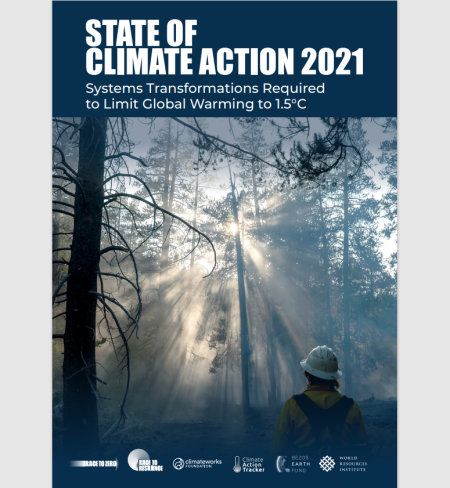
Resource description:
This report from the Systems Change Lab is a joint effort of the High-Level Climate Champions, Climate Action Tracker (CAT, an independent analytic group comprising Climate Analytics and the NewClimate Institute), ClimateWorks Foundation, the Bezos Earth Fund, and World Resources Institute. It provides an overview of how we are collectively doing in addressing the climate crisis. Taking stock of change to date is critical for informing where best to focus our attention and change our future course of action. The report begins with an explanation of transformational change to frame the evaluation of progress. It then assesses the pace of action on mitigation to date in key sectors and compares it with where population needs to go by 2030 and by 2050 to help limit global warming to 1.5°C and avoid the worst climate impacts. While a similar effort is warranted to evaluate the pace of adaptation action, this report’s scope is limited to tracking progress on GHG emissions reductions and the removal of carbon from the atmosphere. The report builds upon and updates previous assessments (Lebling et al. 2020; CAT 2020b). It identifies targets and associated indicators for power, buildings, industry, transport, technological carbon removal, land and coastal zone management, agriculture, and finance that the literature suggests are the best available to monitor sectoral decarbonization pathways. Designed to be compatible with limiting global warming to 1.5°C, these targets for each sector were developed by the CAT consortium, WRI, and the High-Level Climate Champions based on the Marrakesh Partnership Climate Action Pathways and the Race to Zero campaign’s 2030 Breakthroughs (UNFCCC Secretariat 2021b; Race to Zero 2021a).This year, the authors added 18 new targets and indicators to Lebling et al. (2020), bringing the total to 40. The report also improves upon the methodology from the previous assessment to consider the potential of exponential change across some sectors and, accordingly, updates the rating categories. It also identifies financing needs to support the transformations, and considers how the transitions needed can be approached in a just and equitable manner.
The report aims to support decision-makers in government, companies, investing firms, and funding institutions who are considering how to accelerate climate action. A secondary audience is subject experts who support these decision-makers in strengthening implementation of existing commitments and increasing ambition.
Licence:
- Free, no licence